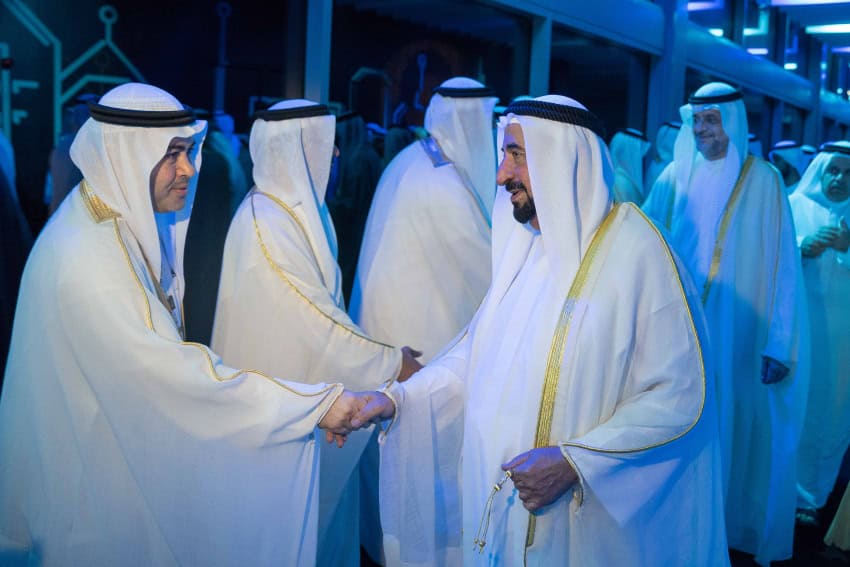SHARJAH – The 7th edition of the International Government Communication Forum (IGCF 2018) opened on Wednesday with an insightful first dialogue session titled, ‘Governments and the Private Sector – Responsibilities and How they Fit in the Age of Digital Communities’, in the presence of His Highness Sheikh Dr. Sultan bin Mohamed Al Qasimi, Supreme Council Member and Ruler of Sharjah.
An expert panel of speakers comprising Sean Spicer, former White House Press Secretary, Naguib Sawiris, Egyptian media mogul who founded Orascom Telecom, and HE Musapha El Khalfi, Morocco’s Minister Delegate and Official Spokesperson of the Government, took part in the session, which was moderated by Mohammed Khalaf, Director General of Sharjah Media Corporation.

The session offered key insights on several issues facing government communication in the digital age, like the gap between public and private sectors in approaching communication with the citizenry, transparency, and responsibility sharing between the public and private sectors with a view to protecting people’s information and interests.
Sean Spicer expressed his excitement at being part of a significant forum that addresses some of the biggest challenges governments around the world are facing today. He said: “We couldn’t be discussing this topic at a better time in light of some of the issues the world is facing right now. We have got a private sector that is creating technology, which is tremendously good for the economy and society, but it is all happening so fast that there is an aspect of government that needs to figure out its relationship with the private sector. What you don’t want to do is stifle these rapid developments. Children and adults around the world are using every digital application available to them and you can’t stop that. Tomorrow there will be new, more developed apps that they will go on to use. So, the question is where is that balance between protecting citizens without interrupting or stifling the development of new technologies.”
He added: “Most times when we download an app we are requested to agree to terms and conditions that are tediously long and difficult to understand, so most of us just accept without knowing what we are committing ourselves to. Where do all the private information that we share about ourselves, our friends and family go? We will be much better safeguarded if the private sector exercises an increased level of transparency.

The need for a regulatory mechanism in communication was highlighted by Naguib Sawiris, who said: “Any business approaches anything, including people’s personal data, for profit. The solution is to bring about a concerted regulatory mechanism that not only represents the government but is comprised of actors in the private sector, NGOs and even individuals. Social media lacks this regulator, and the absence thereof leads to the threat of important data being subjected to misconduct. The recent Facebook issue is an example.”
To the moderator’s question of whether regulations restrict innovation, HE Mustapha El Khalfi remarked: “Digital revolution is an opportunity and a challenge at the same time. It tilts toward the latter when government and private partnerships are absent. Digital security, issuing laws and the protection of individual data are all government responsibilities. When it comes to public services, for example, the technology to safeguard people’s interests is already there. But has the government ventured into it? The government needs to update regulatory laws that allow innovation and at the same time ensure people’s security and freedom.”
All panellists agreed on the need for transparency in communication between the government and private businesses as a way to safeguard people’s interests.
Digital diplomacy can help governments shape effective foreign policy, says expert
Diplomats must demonstrate and prove their presence in today’s digital world through strategic, creative and analysed messages to create an effective foreign policy for their governments, a communication specialist said.
Speaking during an interactive session titled “Digital Diplomacy in Government Communication,” on the day one of the 7th International Government Communication Forum (IGCF), being held from March 28-29 at Expo Centre Sharjah, in Dr Mohammed Ayish, Head of the Mass Communication Department at the American University of Sharjah, said that social media has bridged the communication gap between governments and their people or audiences.

With its challenges and opportunities, digital diplomacy allowed governments to witness people’s reactions directly, giving indicators of public opinion in ways that traditional and public diplomacy has failed to do.
“Digital diplomacy allowed governments to reach the masses, monitor public opinion and adapt their foreign policy and messages based on this interaction,” said Dr Ayish.
To be successful, digital diplomats must be creative in dealing with the big data flow, adapting to the visual requirements of presenting a message with multimedia elements. A digital diplomat must also plan out a long-term strategy in the virtual space while putting in mind that results of communication need time to pan out.

While social media gave governments the opportunity to express reactions to developments and incidents around the world immediately and speak the language of people, its constant transformation and vagueness of data can be misleading, he cautioned.
“Social media is now polluted with fake news and reflects the inaccurate reality of public opinion. Data analysis is a challenge since we are dealing with Cloud Computing and Big Data that forces diplomats to determine their messages through only numbers,” said Dr Ayish.
He called for building a skilled generation of diplomats through training in fields of Artificial Intelligence and technology. There’s no question, he said, that diplomats must come up with new ideas and be present on social media.
Persistence in communication, addressing soft power through showing human aspect of the government and thinking outside the box are main skills for diplomats to have, he emphasised.
He argued that digital diplomacy isn’t merely a communication method or a virtual presence, but a strategy that could serve countries in the long run.
The 7th edition of the IGCF, organised by the International Government Communication Centre of Sharjah Government Media Bureau, features some of the world’s leading opinion makers and political and technical figures in recent years.
Transparency, shared accountability of public and private sectors and citizen protection remain the main discussion themes of Day 1
With the following words: “How will we approach communication going forward?” His Highness Sheikh Dr. Sultan bin Mohamed Al Qasimi, Supreme Council Member and Ruler of Sharjah, set the tone for the International Government Communication Forum (IGCF 2018), as he addressed an audience of over a thousand people at the opening ceremony of the Forum’s seventh edition today (Wednesday).
Organised by the International Government Communication Centre (IGCC) at Expo Centre Sharjah, and themed ‘The Digital Millennium… Where to?’, the proceedings of the two-day Forum (March 28-29) will see the attendance of around 3,000 regional and international luminaries representing both the government and private sectors engaging in lively discussions on the rapidly transforming role of public and private entities in the new digital age.

Over 40 speakers from 16 countries are participating in 11 discussion panels representing diverse themes like ‘Digital Diplomacy in Government Communication’, ‘Media Charisma’, ‘New Media in Serving Humanitarian Issues’, and ‘The Future of Communication’. A host of interactive speeches, workshops and training sessions in cooperation with media institutions and international organisations are also part of the Forum’s two-day itinerary.
Introduced to an audience from around the world as the ‘architect of the Sharjah Renaissance’, His Highness Sheikh Dr Sultan bin Mohamed Al Qasimi, offered a juxtaposition of the UAE’s past and present within the context of the path societal developments have taken in the past 45 years. He said: “The 1967 war forever changed the fate of the Arab world, whose repercussions continue to reverberate around the Middle East. Suddenly, Arab citizens found themselves entering a zone of crisis – of identity and of the human project. We as people need to, overcome this defeat, re-establish a common Arab identity, and form a strong society based on the unity of purpose reflected in creating a safe future for our children.”

The Ruler of Sharjah continued: “Technology if in the wrong hands, can be a dangerous weapon that has the power to turn people into mere puppets. We need to immunise ourselves not by shutting our doors to technology, but by building strong safeguards against misuse, and keep a watchful eye on our sons and daughters.
“The unsupervised almost anarchist use of technology by our sons and daughters is slowly leading them into isolation, and we must stop this. This we have to do by guiding our children to use technology beneficially. This I strongly endorse as a collective responsibility, which begins at home and in schools and extends to the government as well as private actors.”
Sheikh Sultan bin Ahmed Al Qasimi, Chairman of the Sharjah Media Council (SMC), took the discourse of communication and technology to a future time, underlining that children of today are dependent on us to shape the future of technology in ways that will make the world a better place for them.
He said: “Fifteen years ago, we couldn’t have possibly imagined carrying our whole entire lives – our homes, books, wealth, work, offices, personal interests, and even relationships in a tiny device we call the smartphone. It is, however, very much our reality today, an impermanent and uncertain state that will give way to bigger and more complex transformations.”
“As governments, what are we doing to accelerate this digital revolution in a way that benefits us, our people, the private sector and other stakeholders in society? Digital platforms have brought the government and the governed closer than ever before. They have equipped all actors in community with the ability to integrate their vision and goals, unify nation-building efforts and work towards a global strategy of effective government communication characterised by closer public-private partnerships, transparency and better accountability,” he added.
IGCF 2018 Guest of Honour, Dr Ameenah Gurib Fakim, expressed her appreciation to His Highness the Ruler of Sharjah for being invited to what has developed as a unique platform for global leaders to share their insights and build a common vision about the future of global government communication.
“This Forum serves the great purpose of enabling governments to communicate more effectively with citizens and other stakeholders, and is an enduring legacy that leaders and other people under an oath of service to society can be proud of,” she emphasised.
Gurib Fakim outlined the responsibilities of governments in communicating with citizens in three ways. First, they must be proactive in delivering comprehensive and credible information characterised by inclusiveness and other democratic processes. Second, they should provide the infrastructure and tools that enable the timely delivery of precise messages in case of national emergencies or natural disasters. Third, they must safeguard their people and their independence from hostile entities that try to access citizen data and exploit channels of communication for illegal acts.
“If we don’t provide a reliable source of information to our people, the credibility gap will be immediately bridged by others from our countries and beyond, who will always have certain underlying agendas. We don’t have a choice but to provide a strong and integrated national communication infrastructure to ensure delivering communication messages that meet the needs and aspirations of the public, and at the same time comprise the necessary means of protection to ensure that information and data are not breached,” said Gurib Fakim.
She pointed out that the ideal way to prevent manipulation is to further enhance transparency, and criminalise the abuse of personal data for commercial and political reasons.
She underlined that the language of government communication must be transparent, deliberate, credible, understood, timely and managed by experts. She emphasised that messages will not be effective unless they build on previous successful, reliable and frequent messages, calling on governments, which are dedicated to protecting and enhancing the well-being of their people, to think of the manner in which they will use communication channels in the future.

The opening session of the Forum, held in the presence of His Highness the Ruler of Sharjah, featured an expert panel comprising Sean Spicer, former White House Press Secretary, Naguib Sawiris, Egyptian media mogul who founded Orascom Telecom, and HE Mustapha El Khalfi, Minister Delegate and Official Spokesman of Government of Morocco.
Moderated by Mohammed Khalaf, Director General of Sharjah Media Corporation, the session offered key insights on the issue of the gap between public and private sectors in approaching communication with the citizenry.
HH the Ruler of Sharjah also listened to the five interactive speeches that followed. Tanmay Bakshi, the youngest Artificial Intelligence expert in the world and an IBM AI Champion, spoke about the challenges that face the field, as well as potential opportunities in AI as a key driver of the future of government communications.
HE Noura Al Kaabi, UAE Minister for Culture and Knowledge Development, addressed the role of young leaders in governments of the future. Sir Timothy John Berners-Lee, the inventor of the World Wide Web and Chairman of the Open Data Institute, explained why he has been promoting open government data globally and rights such as net neutrality, privacy and transparency of the Web.
Khalifa Hassan Alshamsi, Chief Corporate Strategy and Governance Officer of Etisalat Group in the UAE, shed light on encouraging greater involvement of the communications sector in supporting future governments. Independent policy advisor and founder of the ‘Good Country Index’ and ‘Nation Brands Index’, Simon Anholt discussed the most optimal communication strategies and practices for good governance.
His Highness the Ruler of Sharjah later toured the Forum venue, reviewing various activities and events being held as part of the 2-day communication summit.
In keeping with its goals to pioneer best practices in government communications, the International Government Communication Forum 2018 (IGCF) focuses on the contemporary challenges of government communication in the region and rest of the world and explores solutions which can enhance communications in the future. In doing so, the IGCF will draw a roadmap to improve general communications for a better world in which all nations can enjoy social justice, equality, prosperity and progress.
Through its wide array of panel discussions, the IGCF will explore how government communication can inspire a community through engagement and interaction and the roles and responsibilities of governments in the digital age. The ‘brand’ of a country could be hugely influenced by modern technology, which provides faster and more accessible communication with specific target groups.
Each year, the Forum features more than 2,500 professional experts from around the world, including decision makers, officials, communication experts, government media personnel, civil society organisations and media professionals, as well as students of journalism and communication from all colleges and universities. The Forum addresses a diverse spectrum of issues and affairs dealing with government communication.
Emotion Vs Science: The Two Sides of Communication Explored at IGCF 2018
“Start with Why,” were the first words that came out of the mouth of the Canadian strategy expert, Heath Slawner, who was more concerned about the meaning and purpose of communication, and how leaders connect and inspire by applying the art a bit more selflessly, than the more obvious technicalities that one sees on the surface.
The man’s biggest influence is Start with Why by Simon Sinek, a book that inspires people to be fearless in chasing their dreams and do the things that really inspire them; those that are driven more by the aspect of ‘why’ than that of ‘what’ and ‘how’.
“When we lose our ‘why’, we lose the way. In communication as in any other field, you will only have the capacity to inspire if you know your ‘why’. You must have a clear sense of purpose as that is the only effective way to communicate.”

Slawner cited examples of how some of the biggest corporations in the world like Xerox were bought off by their arch-rivals, Fuji Film, and Kodak thought of themselves for the longest time as being in a business of manufacturing physical films, and resisted the idea of launching the digital camera when Steven Sasson invented the first self-contained digital camera at Eastman Kodak in 1975.
He compared this approach to that of Elon Musk’s who sold over 600,000 electric vehicles in a six-week period in 2016, which was more than all the electric vehicles that the US drove at the time. This was simply because his emphasis has always been on Tesla’s ‘why’: to accelerate the world’s transition to sustainability. His ‘why’ is born out of his eagerness to protect the planet for the future generations.
“Most people can talk about the how, but very few even take notice of the why. By why? I mean what is the reason a government, a company or an individual even exists. What is the emotional human reason for governments to exist? It’s no longer enough for governments to tell people what they do or how they do it, and expect people to support them. That is naïve thinking because research and science have proved time and time again that people make decisions based on emotional reasons and they justify after that the rational reasons. “The emotional reasons all rest in the ‘why’.”
His interaction focused on the emotional aspect of good communication and highlighted that governments need to build trust in their people by being selfless and by showing they care.
Alex Aiken – Communications is a science, not an art
The other side of the spectrum was presented by Alex Aiken, Executive Director of Government Communications for the UK Government, who told the audience at the 7th International Government Communication Forum (IGCF) that unless state messages are based on truth and facts, they will fail.
On the 100th anniversary of the British Ministry of Information, Aiken described the mistakes of past government communication, highlighting the false propaganda of German atrocities during the First World War. When the truths of World War II were relayed to the people, they were dismissed by the public on the grounds that they had been lied to once before and the element of trust had been lost, he pointed out.
“This is why all good government communication must be seen as a ‘Force for Good’ and a ‘Truth Well Told’,” he stressed speaking at the Sharjah forum.
“In a century of trial and error, we have learnt from our mistakes and continue to learn. There is a pride and professionalism within our staff and a desire to progress. We believe that every communication should be a campaign and to influence the audience for the good of the public.
“We must remember that communication is a science, not an art and we need facts, research and data to ensure our messages are truthful and accurate,” he added.
Addressing some of the challenges facing the government communication sector today, Aiken stressed that a new age of technology could be problematic as well as beneficial.
“We have created thousands of campaigns over 100 years and with every generation, we have to rebuild and recreate our messaging. More than ever, governments must develop their ability to listen, respond at pace, manage trust and, of course, manage misinformation.”
Aiken stressed that an effective government communications team must itself be trusted as well as be effective.
UTURN Showcases its Expertise in Enhancing Arabic Content to IGCF 2018 Visitors
UTURN, KSA’s leading Arabic entertainment network on YouTube, hosted two interactive sessions at the International Government Communication Forum (IGCF), organised by the International Government Communication Centre (IGCC), at Expo Centre Sharjah under the slogan ‘Digital Millennium… Where to?’. The two sessions addressed the impact of the fast-changing digital sphere on enhancing Arabic content on the internet.
The first session discussed the tactics and mechanisms in the creation process and development of content throughout the last decade, while the second addressed the role of content in building cultural and social identity and enhancing it at a global level.
Salman Hammad, a content producer at UTURN, discussed the technical elements and the accelerating technological developments that facilitate the process of creating content, and liberating it from traditional media dependence, with each individual having the ability to create and communicate their own content.

He also talked about what he referred to as ‘The Power of Smart Phones’, which provides vast and easy options accessible to all, and facilitates the process of content creation and marketing on social media platforms, such as Facebook, Twitter, Instagram, Snapchat and YouTube.
Hammad underscored the progressive development of interactive and social media content over the last decade, and how it has the potential to develop itself further as a result of the vast and endless possibilities in the digital communication industry.
He underlined that the latest developments contributed to liberating content from its traditional format, and paved the way for its development in a manner that allows creative and innovative ideas to grow.
Hammad shed light on UTURN’s efforts in developing content on social media platforms, and how it was able to achieve tangible results and remarkable success in a very short time.
In the second session, Hammad introduced attendees to advanced practices in photography, and the unique techniques a user can utilise for optimal imageries through mobile devices.
He emphasised the importance of making the most out of such tools, as they are among the key catalysts that have contributed to the development and evolution of various technologies, including tablets and mobile gadgets, as means to cater to a more advanced and dynamic form of communication.
Hammad explained: “Because technology is increasingly becoming more advanced, with imagery styles such as the ‘selfie’ increasingly trending across the social communication networks, the art of photography has evolved much further than the conventional style of imagery.”
Hammad finally described that it’s important for advertisers and social media users to practice different styles of photography, and incorporate as many modern technologies as possible which will contribute to their mass communication strategy and their presence.
Established in Jeddah in 2010, UTURN is a network that achieved more than 1.85 billion views globally, with 100 million monthly views. UTURN’s programmes on YouTube increased from 2 to more than 15 programmes that see a turnout of followers in KSA, UAE and other Arab countries. – PR














